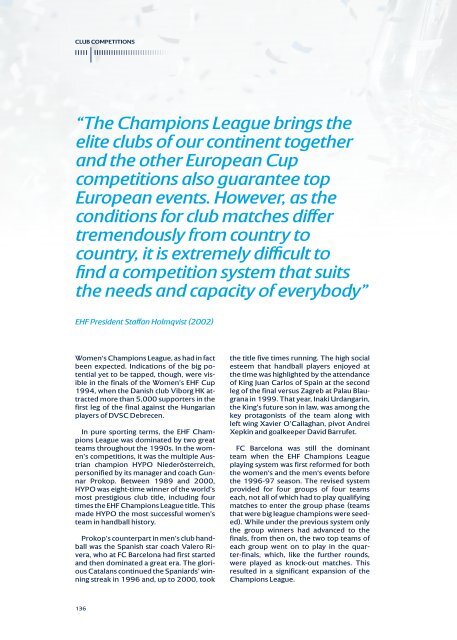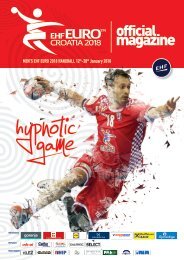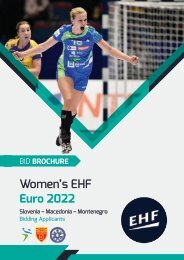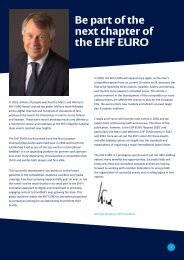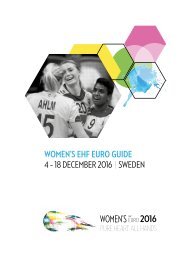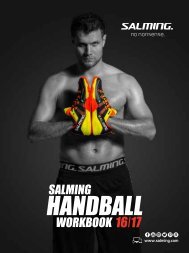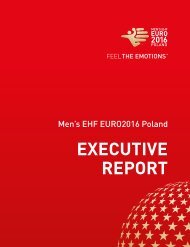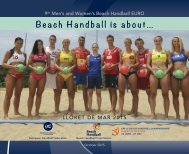ehf_25yers_book_webversion
Create successful ePaper yourself
Turn your PDF publications into a flip-book with our unique Google optimized e-Paper software.
CLUB COMPETITIONS<br />
“The Champions League brings the<br />
elite clubs of our continent together<br />
and the other European Cup<br />
competitions also guarantee top<br />
European events. However, as the<br />
conditions for club matches differ<br />
tremendously from country to<br />
country, it is extremely difficult to<br />
find a competition system that suits<br />
the needs and capacity of everybody”<br />
EHF President Staffan Holmqvist (2002)<br />
Women‘s Champions League, as had in fact<br />
been expected. Indications of the big potential<br />
yet to be tapped, though, were visible<br />
in the finals of the Women’s EHF Cup<br />
1994, when the Danish club Viborg HK attracted<br />
more than 5,000 supporters in the<br />
first leg of the final against the Hungarian<br />
players of DVSC Debrecen.<br />
In pure sporting terms, the EHF Champions<br />
League was dominated by two great<br />
teams throughout the 1990s. In the women’s<br />
competitions, it was the multiple Austrian<br />
champion HYPO Niederösterreich,<br />
personified by its manager and coach Gunnar<br />
Prokop. Between 1989 and 2000,<br />
HYPO was eight-time winner of the world’s<br />
most prestigious club title, including four<br />
times the EHF Champions League title. This<br />
made HYPO the most successful women’s<br />
team in handball history.<br />
Prokop’s counterpart in men’s club handball<br />
was the Spanish star coach Valero Rivera,<br />
who at FC Barcelona had first started<br />
and then dominated a great era. The glorious<br />
Catalans continued the Spaniards’ winning<br />
streak in 1996 and, up to 2000, took<br />
the title five times running. The high social<br />
esteem that handball players enjoyed at<br />
the time was highlighted by the attendance<br />
of King Juan Carlos of Spain at the second<br />
leg of the final versus Zagreb at Palau Blaugrana<br />
in 1999. That year, Inaki Urdangarin,<br />
the King’s future son in law, was among the<br />
key protagonists of the team along with<br />
left wing Xavier O’Callaghan, pivot Andrei<br />
Xepkin and goalkeeper David Barrufet.<br />
FC Barcelona was still the dominant<br />
team when the EHF Champions League<br />
playing system was first reformed for both<br />
the women‘s and the men‘s events before<br />
the 1996-97 season. The revised system<br />
provided for four groups of four teams<br />
each, not all of which had to play qualifying<br />
matches to enter the group phase (teams<br />
that were big league champions were seeded).<br />
While under the previous system only<br />
the group winners had advanced to the<br />
finals, from then on, the two top teams of<br />
each group went on to play in the quarter-finals,<br />
which, like the further rounds,<br />
were played as knock-out matches. This<br />
resulted in a significant expansion of the<br />
Champions League.<br />
136


